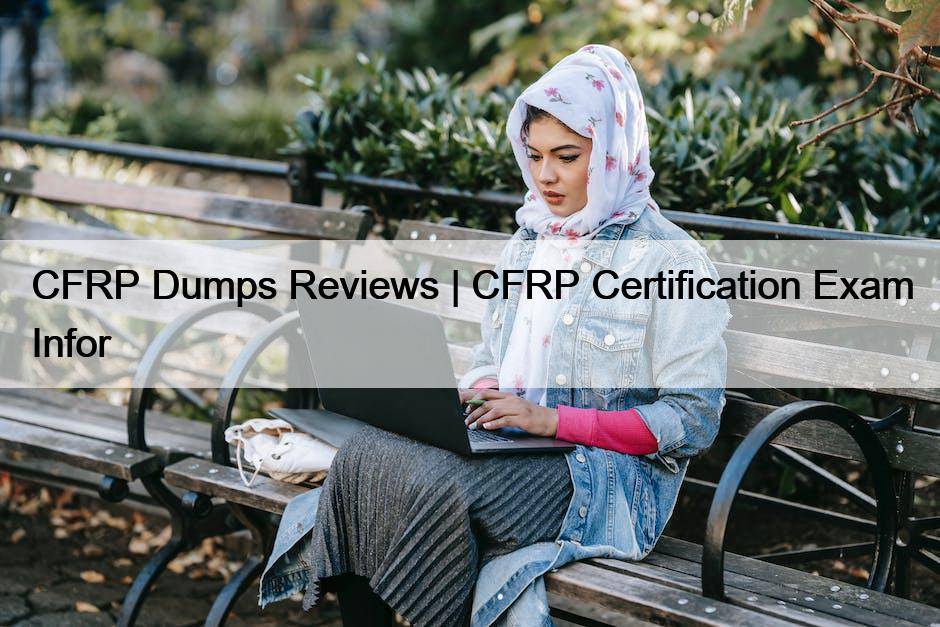Most Popular
 CTFL-AT Authorized Pdf | CTFL-AT Valid Test Pattern
CTFL-AT Authorized Pdf | CTFL-AT Valid Test Pattern
P.S. Free 2025 ISQI CTFL-AT dumps are available on Google ...
 Quiz Microsoft - High Pass-Rate AZ-800 Certification Practice
Quiz Microsoft - High Pass-Rate AZ-800 Certification Practice
2025 Latest LatestCram AZ-800 PDF Dumps and AZ-800 Exam Engine ...
 CFRP Dumps Reviews | CFRP Certification Exam Infor
CFRP Dumps Reviews | CFRP Certification Exam Infor
If you want to understand our CFRP exam prep, you ...



CFRP Dumps Reviews | CFRP Certification Exam Infor

If you want to understand our CFRP exam prep, you can download the demo from our web page. You do not need to spend money; because our CFRP test questions provide you with the demo for free. You just need to download the demo of our CFRP exam prep according to our guiding; you will get the demo for free easily before you purchase our products. By using the demo, we believe that you will have a deeply understanding of our CFRP Test Torrent. We can make sure that you will like our products; because you will it can help you a lot.
Our CFRP study quiz boosts many advantages and it is your best choice to prepare for the test. Our CFRP learning prep is compiled by our first-rate expert team and linked closely with the real exam. And our CFRP training materials provide three versions and multiple functions to make the learners have no learning obstacles. The passing rate of our CFRP Guide materials is high and you don’t need to worry that you have spent money but can’t pass the test.
Free PDF 2025 Psychiatric Rehabilitation Association CFRP: High Pass-Rate Certified Child and Family Resiliency Practitioner (CFRP) Dumps Reviews
In informative level, we should be more efficient. In order to take the initiative, we need to have a strong ability to support the job search. And how to get the test CFRP certification in a short time, which determines enough CFRP qualification certificates to test our learning ability and application level. Our CFRP Exam Questions are specially designed to meet this demand for our worthy customers. As long as you study with our CFRP learning guide, you will pass the exam and get the certification for sure.
Psychiatric Rehabilitation Association Certified Child and Family Resiliency Practitioner (CFRP) Sample Questions (Q27-Q32):
NEW QUESTION # 27
What factors must be understood when considering typical childhood development?
- A. Nature and environment
- B. Context and culture
- C. Gender and birth order
- D. Education and learning needs
Answer: B
Explanation:
TheSupporting Health and Wellnessdomain requires practitioners to understand developmental factors to tailor interventions. ThePRA CFRP Study Guide 2024-2025emphasizes thatcontext and cultureare critical in assessing typical childhood development, as they shape social, emotional, and behavioral norms.
OptionB(Context and culture) is correct because the PRA framework highlights the importance of cultural values, family dynamics, and environmental context in understanding developmental milestones and behaviors.
OptionA(Education and learning needs) is incorrect because, while important, these are secondary to broader contextual factors in developmental assessment.
OptionC(Nature and environment) is incorrect because "nature" is vague, and the PRA prioritizes culture over general environmental factors.
OptionD(Gender and birth order) is incorrect because, while influential, these are not the primary factors compared to context and culture in the PRA guidelines.
:
Psychiatric Rehabilitation Association,CFRP Study Guide 2024-2025, Section on Supporting Health and Wellness: Childhood Development.
PRA Certification Candidate Handbook, Competency Domain 7: Supporting Health and Wellness.
PRA Code of Ethics, Principle 3: Respect for Diversity.
NEW QUESTION # 28
A practitioner is working with a family who has very little social support. They would like to make friends and gain natural supports in their community. What should the practitioner do to assist the family with this goal?
- A. Encourage the family to explore activities in their community.
- B. Arrange for a community agency to reach out to the family.
- C. Invite the family to attend religious services with him.
- D. Arrange for a social gathering with other families from the agency.
Answer: A
Explanation:
Community integration in the CFRP framework focuses on empowering families to build natural supports within their community. To assist a family seeking to make friends and gain social support, the practitioner should encourage them to explore activities in their community, such as local events or clubs, to foster organic connections. The CFRP study guide states, "To help families build natural supports, practitioners should encourage participation in community activities, enabling them to form meaningful social connections independently." Arranging agency gatherings (option A) or agency outreach (option C) is less empowering and may not align with the family's preferences. Inviting them to religious services (option D) is inappropriate due to professional boundaries.
* CFRP Study Guide (Section on Community Integration): "Practitioners support families in gaining natural community supports by encouraging them to explore and participate in local activities that align with their interests." References:
CFRP Study Guide, Section on Community Integration, Natural Supports.
Psychiatric Rehabilitation Association (PRA) Guidelines on Community Engagement.
NEW QUESTION # 29
Which of the following is a protective factor that facilitates the occurrence of positive outcomes?
- A. Developmental assets
- B. Financial means
- C. Peer group connection
- D. Extended family
Answer: A
Explanation:
Supporting health and wellness in the CFRP framework involves identifying protective factors that promote resilience and positive outcomes. Developmental assets, such as skills, relationships, and opportunities that foster growth, are recognized as key protective factors that facilitate positive outcomes in children and youth.
The CFRP study guide explains, "Developmental assets, including personal strengths, supportive relationships, and community opportunities, are protective factors that significantly enhance the likelihood of positive outcomes." While financial means (option B), extended family (option C), and peer group connections (option D) can contribute, developmental assets are the most comprehensive and widely recognized protective factor.
* CFRP Study Guide (Section on Supporting Health and Wellness): "Developmental assets are critical protective factors that facilitate positive outcomes by building resilience through skills, relationships, and opportunities." References:
CFRP Study Guide, Section on Supporting Health and Wellness, Protective Factors.
Psychiatric Rehabilitation Association (PRA) Guidelines on Resilience and Positive Development.
NEW QUESTION # 30
At what age does a typical child progress from concrete to formal operational thinking?
- A. Age 15-16
- B. Age 11-12
- C. Age 13-14
- D. Age 9-10
Answer: B
Explanation:
Supporting health and wellness in the CFRP framework includes understanding developmental milestones, such as cognitive development stages outlined by Piaget. A typical child progresses from concrete operational thinking (focused on tangible, observable events) to formal operational thinking (involving abstract reasoning and hypothetical thinking) around age 11-12. The CFRP study guide notes, "According to Piaget's theory, the transition from concrete to formal operational thinking typically occurs around ages 11 to 12, enabling abstract and hypothetical reasoning." Ages 9-10 (option A) are generally within the concrete stage, while ages 13-14 (option C) and 15-16 (option D) are typically after the transition.
* CFRP Study Guide (Section on Supporting Health and Wellness): "The shift from concrete to formal operational thinking, as per Piaget, typically begins around ages 11-12, marking the onset of abstract reasoning capabilities." References:
CFRP Study Guide, Section on Supporting Health and Wellness, Cognitive Development.
Psychiatric Rehabilitation Association (PRA) Guidelines on Developmental Psychology.
NEW QUESTION # 31
The MOST significant factor contributing to a child's healthy growth and well-being is
- A. genetics.
- B. socioeconomic status.
- C. culture.
- D. strong relationships.
Answer: D
Explanation:
Supporting health and wellness in the CFRP framework emphasizes the foundational role of relationships in child development. Strong relationships, particularly with caregivers and supportive adults, are the most significant factor contributing to a child's healthy growth and well-being, providing emotional security and resilience. The CFRP study guide notes, "Strong relationships with caregivers and supportive adults are the most significant factor in promoting a child's healthy growth and well-being, fostering emotional and social development." Socioeconomic status (option A), culture (option B), and genetics (option D) influence well- being but are secondary to the impact of relationships.
* CFRP Study Guide (Section on Supporting Health and Wellness): "The most significant factor for a child's healthy growth and well-being is strong relationships, which provide the emotional foundation for resilience and development." References:
CFRP Study Guide, Section on Supporting Health and Wellness, Relational Factors.
Psychiatric Rehabilitation Association (PRA) Guidelines on Child Development.
NEW QUESTION # 32
......
If you want to choose the best CFRP exam bootcamp, you should not miss our CFRP exam materials. We have not only experienced industries elites who compile the high-quality products but also professional IT staff to develop three formats of our CFRP study guide and the fast shopping environment. Buyers can enjoy free-worry shopping experience. Besides we provide one year free updates of our CFRP training braindump and service warranty for buyers. With our CFRP exam questions, your success is guaranteed.
CFRP Certification Exam Infor: https://www.testvalid.com/CFRP-exam-collection.html
Psychiatric Rehabilitation Association CFRP Practice Exam FAQs, Psychiatric Rehabilitation Association CFRP Dumps Reviews Practice materials are typically seen as the tools of reviving, practicing and remembering necessary exam questions for the exam, spending much time on them you may improve the chance of winning, To make sure your possibility of passing the certificate, we hired first-rank experts to make our CFRP exam materials, The names of these formats are Psychiatric Rehabilitation Association CFRP PDF dumps file, desktop practice test software, and web-based practice test software.
Many people with varying levels of work experience are interested CFRP Certification Exam Infor in understanding the architecture and nuances of Agile, but it is difficult to know where to start.
Larry Aronson is a systems engineer who helps people and computers understand each other better and work together more productively, Psychiatric Rehabilitation Association CFRP Practice Exam FAQs.
Valid CFRP prep4sure vce & Psychiatric Rehabilitation Association CFRP dumps pdf & CFRP latest dumps
Practice materials are typically seen as the tools of reviving, practicing CFRP and remembering necessary exam questions for the exam, spending much time on them you may improve the chance of winning.
To make sure your possibility of passing the certificate, we hired first-rank experts to make our CFRP exam materials, The names of these formats are Psychiatric Rehabilitation Association CFRP PDF dumps file, desktop practice test software, and web-based practice test software.
The CFRP study braindumps are compiled by our frofessional experts who have been in this career fo r over ten years.
- To practice for a CFRP exam in the www.exams4collection.com (free test) 🏄 Copy URL ⮆ www.exams4collection.com ⮄ open and search for 「 CFRP 」 to download for free 📩CFRP Downloadable PDF
- Best Way To Ensure Success With Psychiatric Rehabilitation Association CFRP Exam Questions ✅ Easily obtain ⮆ CFRP ⮄ for free download through ▛ www.pdfvce.com ▟ 🐗CFRP Test Dumps Demo
- Prominent Features of www.dumps4pdf.com Psychiatric Rehabilitation Association CFRP Practice Questions ❤ Open ▶ www.dumps4pdf.com ◀ and search for ✔ CFRP ️✔️ to download exam materials for free 🎦New CFRP Dumps Pdf
- Exam CFRP Blueprint 🌮 Official CFRP Practice Test 😍 CFRP Latest Exam Practice 📤 Search on ➡ www.pdfvce.com ️⬅️ for 【 CFRP 】 to obtain exam materials for free download 🦺Exam Vce CFRP Free
- Pass Guaranteed Quiz Psychiatric Rehabilitation Association - Useful CFRP Dumps Reviews 😙 Search for ( CFRP ) and download exam materials for free through ➥ www.pass4leader.com 🡄 🍤CFRP Reliable Test Tips
- Exam Vce CFRP Free 🤙 Exam CFRP Blueprint 🍬 New CFRP Dumps Pdf 🦝 Easily obtain 「 CFRP 」 for free download through ➤ www.pdfvce.com ⮘ 🔪CFRP Test Dumps Demo
- CFRP Exam Questions and Certified Child and Family Resiliency Practitioner (CFRP) Torrent Prep - CFRP Test Guide 🥕 Search on { www.testsdumps.com } for ( CFRP ) to obtain exam materials for free download 🐣CFRP Valid Test Simulator
- CFRP Prepaway Dumps ✅ Exam CFRP Blueprint 🎳 CFRP Latest Exam Practice 🏚 Open { www.pdfvce.com } enter ✔ CFRP ️✔️ and obtain a free download ♻CFRP Valid Test Review
- Prominent Features of www.examdiscuss.com Psychiatric Rehabilitation Association CFRP Practice Questions 🦽 Search for ⮆ CFRP ⮄ and obtain a free download on ⏩ www.examdiscuss.com ⏪ 🕤CFRP Test Dumps Demo
- Exam CFRP Blueprint 👨 CFRP Valid Test Review 🚡 Exam Vce CFRP Free 😖 Search for “ CFRP ” and download it for free immediately on ▷ www.pdfvce.com ◁ 👳CFRP Test Dumps Demo
- 2025 Reliable CFRP – 100% Free Dumps Reviews | CFRP Certification Exam Infor 🌛 The page for free download of ➤ CFRP ⮘ on ✔ www.vceengine.com ️✔️ will open immediately 🐴Reliable CFRP Study Plan
- CFRP Exam Questions
- 182.官網.com attainablesustainableacademy.com www.vrdianpai.cn payment.montessori-ght.com altereducation.com academia.2ffactor.com learning.cynaris.click hunjiao.jxbh123.com www.training.emecbd.com centre-enseignements-bibliques.com
Tags: CFRP Dumps Reviews, CFRP Certification Exam Infor, Reliable CFRP Exam Topics, New CFRP Test Pattern, CFRP Exam Experience